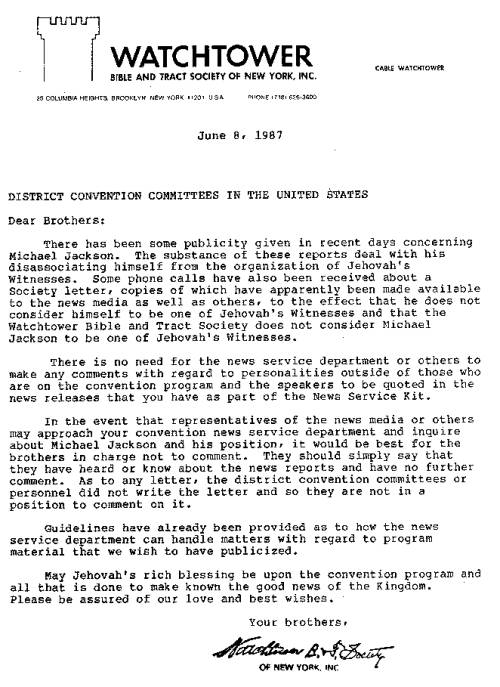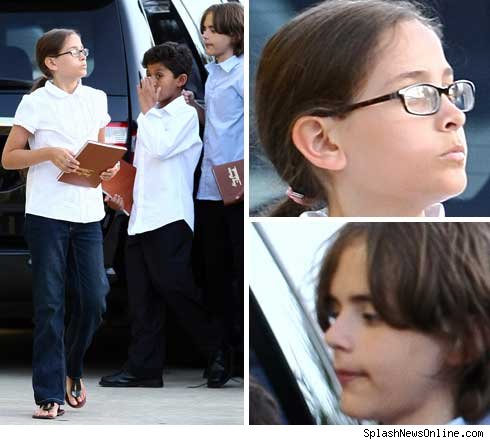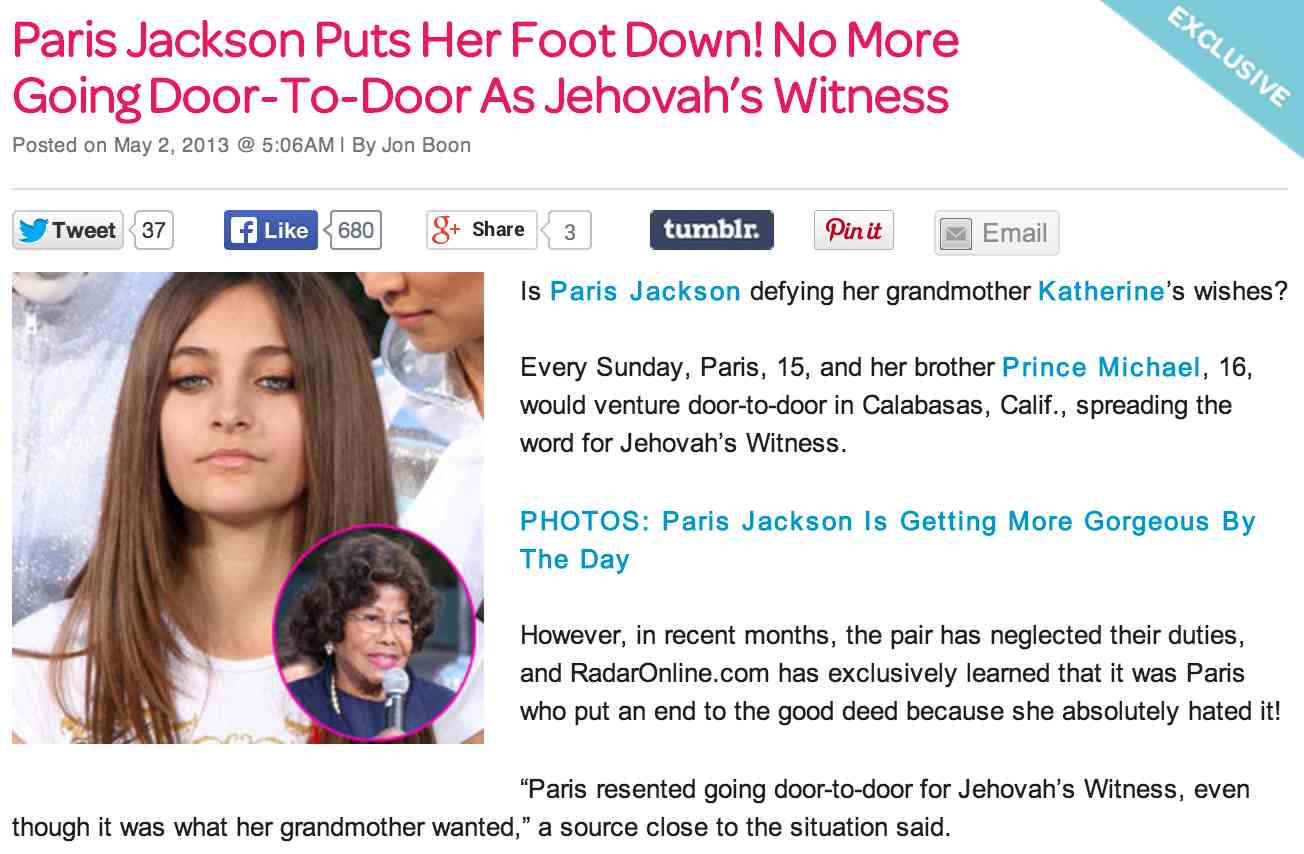home > interesting topics > experiences > michael jackson
Michael Jackson's life as a Jehovah's Witness
The following information comes predominantly from Michael's biography "Michael Jackson: The Magic and the Madness"[1] and La Toyo's autobiography "La Toya: Growing Up in the Jackson Family".[2]
Katherine Jackson (Michael's mother) was baptised in 1963 when Michael was 5 years old. Michael was raised as a Jehovah's Witness and was active in meeting attendance and preaching until his disassociation in 1987. La Toya was also active during her teenage years. As of the time of writing this article in 2009, the only active Witnesses in the Jackson family are Katherine and Rebbie, whose husband is an elder. Michael's father, Joseph never adopted the religion.
"Katherine Jackson, a strong force in the lives of her children, passed on to them a deep and abiding respect for certain religious convictions. She had been a Baptist and then a Lutheran but turned from both faiths for the same reason: she discovered that the ministers were having extramarital affairs. When Michael was five years old Katherine became a Jehovah's Witness, converted by a door-to-door worker. She was baptised in 1963 in the swimming pool at Roosevelt High in Gary. From then on, she asked that the rest of the family get dressed in their best clothes every Sunday and walk with her to the Kingdom Hall, their place of worship." Michael Jackson: The Magic and the Madness p.17
Michael regularly went preaching, donning disguises to avoid recognition.
"Michael and I were very active in the Jehovah's Witness faith. ... Five days a week the two of us and Mother studied the Bible at home and attended the Kingdom Hall. ... Every morning Michael and I witnessed, knocking on doors around Los Angeles, spreading the word of Jehovah. ... As my brother's fame grew, he had to don convincing disguises, like a rubber fat suit he bought years later, .." La Toya: Growing Up in the Jackson Family pp.53-4.
By 1984, despite his tremendous fame and great fortune, Michael Jackson still continued door-to-door proselytizing for the Jehovah's Witness faith, 'twice a week, maybe for an hour or two,' according to Katherine. He also attended meetings at Kingdom Hall with his mother four time a week, when he was in town.
An example of a typical day of spreading The Word: wearing a disguise - a moustache, hat and glasses - and a tie and sweater, and holding a copy of Watchtower, Michael sttod at the door of an apartment in suburban Thousand Oaks, California, one morning in early 1984. 'I'm here to talk to you about God's word,' he told the young girl who answered the bell.
She slammed the door in his face.
He went to the next apartment. ...
More than ever before, Michael considered himself a strict Jehovah's Witness. He didn't believe in blood transfusions, Easter and Christmas (which he viewed as 'pagan holidays'), of the celebration of his own birthday....
Despite the fact that Michael was devout - and no doubt had donated quite a bit of money to the religion - the church's elders were upset with him in 1984, mostly because of the 'Thriller' video." Michael Jackson: The Magic and the Madness pp.269,270
It is not difficult to understand the unusual enigma that Michael became when considering the extremes of his upbringing. On one hand he had a violent, materialistic, philandering father. On the other hand was a loving mother attempting to indoctrinate him into her equally unbalanced Watchtower belief system. [3] To top it all off, from childhood to death he experienced a level of wealth, fame and recognition unequalled by almost any person to have ever lived, including the greatest leaders of previous centuries.
The confliction of ideas experienced between the example of the mother and father must have caused great confusion.
"At an early age, Michael received mixed signals about sex. The message from Katherine was loud and clear; with her strong faith as a Jehovah's Witness, lust in thought or in deed was considered sinful. According to 1 Corinthians 6:9, none of the unrighteous - 'neither fornicators, nor idolaters, nor adulterers, nor effeminate men, nor abusers of themselves with mankind' - would inherit the Kingdom of God. Therefore, physical intimacy was reserved for marriage.
However, from Joseph, who shunned the religion Katherine had embraced, the boys received a message that came more from his actions than from his words. He [Michael] must have been conflicted: he had an overly rigid view of the world from his mother and an overly promiscuous view of the world from his father.
One of The Jackson Five's early performance numbers was their rendition of soul singer Joe Tex's raucous 'Skinny Legs and All'. As part of the act, Joseph encourage your Michael to go into the audience, crawl under tables, lift up women's skirts, and peek at their panties. After a show like this one, the boys would go home to their religious mother, who would then tuck them into bed and remind them of the virtues of being a good Jehovah's Witness. She truly never knew anything about the nightclub act until many years later.
Of course, when the Jackson boys were on the road, Katherine remained at home with the younger children. Her absence gave Joseph carte blanche to date other women - mostly groupies. 'He used to do the meanest things to us,' Michael once told me of his father. He said he was revolted by the thought of whatever was occurring in Joseph's room with his girlfriends." Michael Jackson: The Magic and the Madness pp.30-32
As a Witness, Michael was taught that much of what he himself personally stood for was wrong, even evil. Consider the following Watchtower concepts:
- Ambition and the pursuit of fame is wrong
- Awake 2005 6/8 p.13 Is It Wrong to Be Ambitious? - "The Bible indicates that haughty ambition is linked to human imperfection. ... Christians today take to heart Jesus words and humble themselves, while following the example of the aged apostle John, who learned to shun ambitious tendencies. For true Christians the subject of ambition does not present an ethical dilemma. Their Bible-trained consciences help them to shun ambition.
- Watchtower 1978 4/1 p.3 How Rewarding Is the Pursuit of Fame and Fortune? - "Clearly, the pursuit of fame and fortune is not satisfying. Since this is also true of other material goals, what should a person make his primary aim in life? ... So, instead of looking enviously at the few who have attained fame and fortune, we will be content in having something far more valuablean approved relationship with the Most High."
- Love of money is evil
- Awake 1997 9/22 p.14 What Is Wrong With Making Money? - "True, having money may give one a sense of freedom. But as Paul explains, in the long run, pursuing money can actually make one a slave to many senseless and hurtful desires, which plunge men into destruction and ruin. Yes, once the love of money sinks its teeth into you, covetousness, murderous jealousy, and other hurtful desires can dominate."
- Watchtower 1997 3/15 p.20 - "If a Christian developed a love of money, he would cause himself much spiritual harm. The Pharisees were money lovers, and this is a trait of many in these last days. (Luke 16:14; 2 Timothy 3:1, 2) In contrast, a Christians manner of life should be free of the love of money.
- Idolatry of human stars is unchristian
- Watchtower 1996 6/15 p.18 - "Antitypical EgyptSatans worldvirtually worships entertainment. (1 John 5:19; Revelation 11:8) It idolizes actors, singers, and sports stars, as well as their dancing, their music, their concepts of fun and good times. Yet, today most worldly music, dancing, movies, and videos cater to corrupt fleshly desires.
- Watchtower 1993 1/15 pp.28-29 Guard Against Idolatry of Every Sort - "Gods people also refrain from idolizing the worlds stars of entertainment and sports. ... But some come to view the artist as their ideal, and by putting him on a pedestal, they make him into an idol. They may hang the stars picture on the wall and begin to dress and groom themselves as he does. Christians need to keep in mind that adoration belongs only to God.
- Most modern music is unchristian
- Watchtower 1996 6/15 p.18 - " Yet, today most worldly music, dancing, movies, and videos cater to corrupt fleshly desires."
Michael was accused of being homosexual. This too was a cause of guilt and shame.
"The truth is Michael would never have allowed himself to have homosexual relationships, even if he did have feelings for other men. He was too puritanical as a result of his religious background. The Jehovah's Witnesses firmly believe that world destruction is imminent and that only a few of God's servants will survive the horrible holocaust. If he wanted to be saved - if he wanted to be with his mother through all eternity - he would have to live up to all of the church's rigid teachings, which sure meant he couldn't be gay. Indulgence is not part of the Jehovah's Witnesses' creed. Any congregant who does not adhere to the rules and dogma is shunned or 'disfellowshipped'. By the time Michael was a teenager, he had been trained to live his life a certain way. He would not be able to break that conformity." Michael Jackson: The Magic and the Madness p.158
Michael was still a Witness at the time of releasing the Thriller album, causing a stir amongst the congregations. Michael appears in bed with a woman during a scene in Billy Jean and Thriller contained occult overtones. Sources within Michael's congregation claim he was publicly reproved for the Billy Jean video, and it is interesting that the Watchtower went to the effort to include a public apology from Michael regarding the Thriller video clip in a 1984 edition of the Awake.
"In another popular video, Thriller, the performer is seen to transform first into a "cat person," then a dancing "monster." Evidently not wanting viewers to conclude that it promoted spiritism, the film begins with the disclaimer: "Due to my strong personal convictions, I wish to stress that this film in no way endorses a belief in the occult.-Michael Jackson." Nevertheless, it was so realistic that some who saw it admitted that they were horrified at first. What was this short film intended to convey? And how does the performer, Michael Jackson, feel about it in looking back? "I would never do it again!" says Jackson. "I just intended to do a good, fun short film, not to purposely bring to the screen something to scare people or to do anything bad. I want to do what's right. I would never do anything like that again." Why not? "Because a lot of people were offended by it," explains Jackson. "That makes me feel bad. I don't want them to feel that way. I realize now that it wasn't a good idea. I'll never do a video like that again!" He continues: "In fact, I have blocked further distribution of the film over which I have control, including its release in some other countries. There's all kinds of promotional stuff being proposed on Thriller. But I tell them, 'No, no, no. I don't want to do anything on Thriller. No more Thriller.'"" Awake! 1984 May 22 pp.19-20
In 1987, Michael disassociated himself from the Watchtower Society.
"At this same time, the Jehovah's Witnesses' elders in Woodland Hills, California, began pressuring Michael again. They felt strongly that the recent publicity on the Witnesses was doing them great damage, and that it reflected poorly on the Witnesses, because Michael was so representative of the faith. Michael was becoming disenchanted with the church's elders by this time, mostly because he didn't wan to be told what to do. What's more he couldn't reconcile his lifestyle and career with the religion's strict tenets. In truth, it's almost impossible to be a Jehovah's Witness and be an entertainer. Therefore, in the spring of 1987, Michael withdrew from the Jehovah's Witnesses. A letter from the Jehovah's Witnesses headquarters in Brooklyn, New York, sent as a press release, stated that the organization 'no longer considers Michael Jackson to be one of Jehovah's Witnesses.' Gary Botting, author of The Orwellian World of Jehovah's Witnesses and a Witness himself, said that leaving the religion is 'worse than being disfellowshipped, or kicked out." He observed, 'if you wilfully reject God's holy organization on earth, that's the unforgivable sin, the sin against the Holy Spirit.'
Michael's decision to leave the church puzzled his mother, Katherine, and caused her great despair. Katherine wasn't sure she knew her own son any longer. However, there was no discussing the spiritual matter with him - literally. As it is strictly prohibited for a Witness to discuss matters of faith with ex-members, even if they are family, Katherine says that she has never asked Michael what happened, and she says that she never intends to ask such questions. 'I was not required to "shun" my son,' she claimed, referring to rumours of that nature. 'But we can't talk about matters of faith any longer, which is a shame.'" Michael Jackson: The Magic and the Madness p.363
The publicity surrounding Michael's disassociation promoted the Watchtower headquarters to send the following letter to the Body of elder's and Circuit Overseers explaining how to reply to questions.

Even after Michael disassociated in 1987 he likely still suffered greatly from guilt, as he retained much of the Watchtower belief system. By disassociating, Michael now became part of the group that the Watchtower classifies as the AntiChrist and as such to be hated by Witnesses.
"Such ones willfully abandoning the Christian congregation thereby become part of the 'antichrist.'" Watchtower 1985 Jul 15 p.31
"Our attitude toward apostates should be that of David, who declared: "Do I not hate those who are intensely hating you" Watchtower 1992 Jul 15 pp.12-13
In 1993, Elizabeth Taylor organised Michael's first Christmas celebration. The following home video show's Michael's excitement but also discusses his guilt, feeling what he was doing was wrong.
Of the Jackson children, Rebbie, La Toya and Michael were the most devoted Witnesses. The disfellowshipping of La Toya contributed to Michael disassociating, as he could not accept the elders right to dictate that he could no longer associate with his sister. La Toya writes:
"... because we were supposed to associate exclusively with other members, Michael and I made few friends at the private high school ... We did, however, become close with another [Jehovah's] Witness. Darles was my first and only friend outside the family, and I treasured the time we spent together. ... Each day at lunch the three of us studied the Bible together. She also joined us at the Kingdom Hall. During a meeting, Darles bravely challenged one of the elders. ... The elder's reply was typical. He cited the scripture, which supported his position but did not really address Darles's point. So she wrote a letter ... This outraged the other elders. One day Rebbie's husband, Nathaniel [Brown], also an elder, cornered me. 'LaToya,' he said, 'you're never allowed to speak to Darles again. Ever. ... She's been disfellowshipped.' ... After that neither Michael nor I had anything to do with Darles. We missed her so much and for the first time began to privately reconsider some of the [WatchTower Society's] teachings. We felt that questions should be encouraged, not silenced through threats of disfellowship." - La Toya: Growing Up in the Jackson Family pp.55-56.
"On the Victory tour, ... , [Michael] hired someone whose sole task was to locate a Kingdom Hall in each town so that Michael wouldn't miss a single meeting. ... Michael ... won those record-breaking eight honors at the 1984 Grammy Awards. The very next morning one elder issued him an ultimatum that my brother must choose between music and the [Jehovah's Witness] religion. ... Because Michael diligently studied the Bible, he could usually cite chapter and verse supporting his contention that entertaining people was not wrong. 'I'm still living according to the [WatchTower Society's] teachings,' he pointed out, as he'd done so many times before. I still go door to door wherever I am, even if I'm on tour. I can't help it if people hang up my poster on their wall or tear my picture out of a magazine. I don't ask them to idolize me. I only want them to enjoy my music.' ... many Jehovah's Witnesses used to congregate outside the Kingdom Hall hoping to catch a glimpse of Michael Jackson, knowing full well this kind of adulation was forbidden. Michael did everything humanly possible to demonstrate his dedication to Jehovah. Once when an elder criticized, 'Your movements on stage suggest sex; don't do them anymore,' my brother complied without protest and promptly changed the routine. He also invited an elder on tour to see for himself that he lived in harmony with all the faith's rules, canvassed door to door, and attended all the meetings. ... One day I walked into Janet's room to find Michael crying his eyes out. 'LaToya, ... I can't talk to you ever again. ... The elders had a big meeting, and they told me never to speak to you because you haven't been coming to the Kingdom Hall. ... they said that if I don't stop talking to you, they'll kick me out of the religion.' ... Michael decided to disobey the elders' edict and after that never attended any more meetings. ... he subsequently severed his ties to the organization through a formal letter. What made this painful episode even more agonizing was that for a long time I believed Michael might be one of the Remnant, the select 144,000." - La Toya: Growing Up in the Jackson Family pp.196-200.
Prior to Michael's death he was reported to have converted to Islam. Due to his religious convictions and having "disassociated" from Jehovah's Witnesses, Watchtower regulation dictates that he could not have a Watchtower funeral.
"What if the deceased was disfellowshipped? The congregation would generally not be involved. The Kingdom Hall would not be used. If the person had been giving evidence of repentance and manifesting a desire to be reinstated, a brother's conscience might allow him to give a Bible talk at the funeral home or graveside, to give a witness to unbelievers and to comfort the relatives. Before making this decision, however, it would be wise for the brother to consult with the body of elders and give consideration to what they may recommend. In situations where it would not be wise for that brother to be involved, it may be appropriate for a brother who is a member of the deceased person's family to give a talk to console the relatives." Kingdom Ministry Mar 1997 p.7 Question Box
However, the Jackson family did hold what reporters have described as a Witness ceremony.
"Tuesday morning, the family had a quick breakfast and then got into their vehicles for the convoy to the 30- to 40-minute private service. About 70 relatives gathered at Forest Lawn, where Jackson's cousin Wendell Hawkins conducted a Jehovah's Witness service, according to Fossett and another cousin, Myron Hawkins, who is Wendell Hawkins' brother.
Jehovah's Witness ceremony
Fossett, who is not a Jehovah's Witness, describes the service as "spoken in a way that their belief is that (God) is going to be back on this earth." Wendell Hawkins "addressed guests and said he was glad that (Michael's) life was connected with Jehovah." During the service, John 3:16 was read, the Biblical passage that speaks to God so loving the world that he gave his only son, and Ecclesiastes 9:5, which refers to the living knowing they will die, but the dead being conscious of nothing." msnbc.msn.com/id/31838593 updated 9:55 p.m. ET July 9, 2009
After Michael's death his three children went into the custody of Katherine Jackson. Within a week of Michael's burial Paris, Prince Michael 1 and Prince Michael 2 were photographed attending the kingdom hall with their song books.

tmz.com/2009/07/15/jackos-kids-let-us-pray
Radar Online reported that in 2013 Paris stopped going preaching.

Footnotes:
[1] Michael Jackson: The Magic and the Madness (Paperback) J. Randy Taraborrelli (2003 ed.)
[2] La Toya: Growing Up in the Jackson Family, La Toya Jackson, Patricia Romanowski, (1991)
[3] To understand the unusual upbringing experienced by Jehovah's Witness children see Growing up a Jehovah's Witness.
